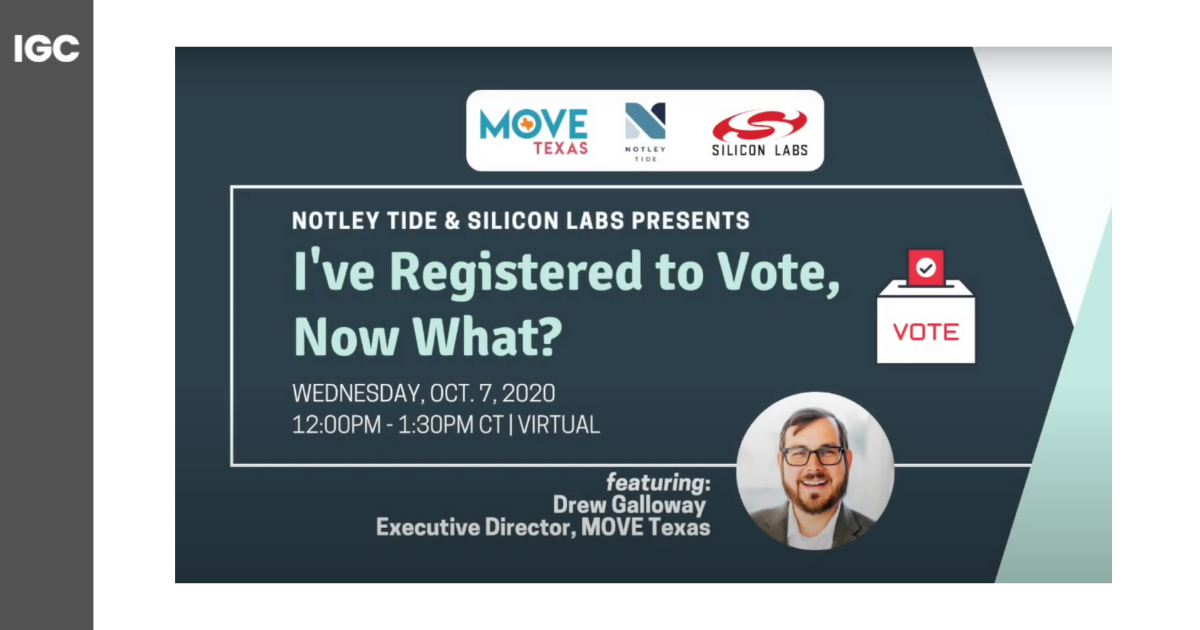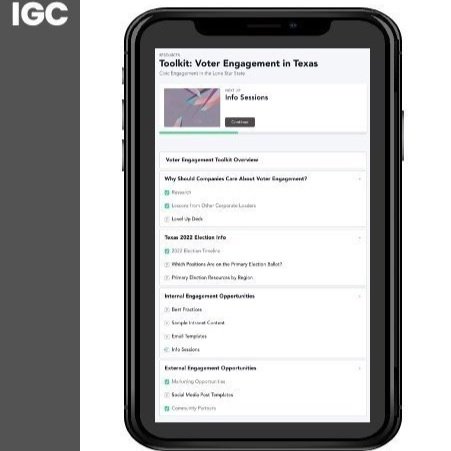Six Best Practices for Your Business to Encourage Civic Engagement
Every election, there are several major, national efforts to encourage US citizens to vote. While your company may be afraid to get "political," there is a substantial difference between financially supporting candidates and encouraging the civic engagement of your employees and customers. The best part is, promoting voter engagement isn’t just good for our democracy – it’s good for business.
The Data
A recent Harvard study found that business benefits of encouraging voter participation include “meeting consumer expectations for engagement in social and political issues, raising brand awareness with new audiences, and increasing employee satisfaction.” Additionally, a Global Strategy Group survey revealed that people are:
76% more likely to work for a company that promotes democracy
81% more likely to buy that company’s products or services
81% more likely to recommend the company
Now that you know encouraging people to vote is good for business, what can you do about it? The short answer: make it easy.
In a lot of states, voting is unnecessarily difficult. For instance, in Texas, just to register to vote, you have to complete and hand-sign a voter registration form, then submit it to someone who is officially deputized as a voter registrar. On top of that, voting information can be hard to find, buried in the depths of a state government website, random organizations' blogs, and a million other places. Early voting and Election Day polling locations and open times may be different, and it can be a challenge to figure out what is actually on your ballot. No wonder voter turnout isn't higher!
To help your company get out the vote, we've compiled six best practices to follow.
The Best Practices
1. Give employees paid time off to vote.
Some companies make Election Day a company holiday; others just make it known to all employees (and their managers) that they will be paid and won't be penalized for taking time to vote early or on Election Day. To make it easier for people to find the time to vote, some organizations make Election Day a “no meeting day.” Additionally, some companies offer paid time off for people to work at the polls. Whatever you decide, make sure the policy is well-known within the company and people know who to ask if they have questions. (See this sample voting leave policy from SHRM.)
Business Success Story
The Time to Vote initiative, started by the CEO of Patagonia, secured pledges from 2,000 companies to ensure “employees have a work schedule that allows them to vote or, if applicable, resources for mail-in ballots.”
2. Communicate frequently about voting dates and deadlines.
Share information about voter registration, early voting, Election Day, etc. internally (via email, internal chat/Slack, break room TVs, company/team meetings, etc.) and externally (via social media, newsletters and blogs). Encourage employees and customers to spread the word with their family and friends. To help you get a head start, we offer internal and external communication templates that you can copy/paste/tweak for your audience. Request to join our private community to get access to these resources.
Data-Driven Support
94% of voters agree that ensuring all eligible Americans can vote is a nonpartisan issue. Our out-of-the-box toolkit helps companies advocate for democracy and educate employees and other stakeholders to become civically engaged.
3. Provide information about key issues.
Invite employees, customers, and other key stakeholders to information sessions/”lunch and learns” with nonpartisan experts who can share more about what's on the ballot or general information about why voting is so important. For example, you can have a local election official share voting information, a school superintendent speak about a school bond or a nonprofit talk about a transportation initiative. Another great approach is to ask employees to share information with their peers. IGC has helped companies by offering volunteer deputy registrar trainings; then, those registrars host registration drives for employees and/or the local community. It’s a great way to engage employees and build your brand as good corporate citizens.
Nonpartisan Expert Speakers
A great example of organizations willing to provide nonpartisan information to companies is MOVE Texas, a 501c3 nonprofit organization that provides civic education, leadership development and issue advocacy across the state.
4. Get creative and make it fun.
Voting doesn’t have to be all serious. Run a social campaign and encourage employees to post pictures with their "I Voted" stickers. Hold a "Turnout for Tacos" event where everyone meets at a polling place to vote together, then brings their "I Voted" sticker for taco from a local restaurant. At our Turnout for Tacos event in Austin, we offered Democrat, Republican and Independent tacos from Torchy's because no one in their right mind can turn down a free Torchy's taco (especially politically themed and covered in queso)!
Creative Communications and Events
Starting in 2018, the IGC founders hosted events for the primaries and general elections called “Turnout for Tacos.” The group voting event was a fun, team-building way to encourage corporate civic engagement.
5. Support organizations focused on increasing civic participation.
Whether it’s a financial contribution or providing paid time off for employees to volunteer at a civics-related organization, supporting organizations dedicated to improving civic engagement is important. Examples of national nonprofits focused on voter engagement, democracy and civic education include: Leadership Now Project, League of Women Voters, Civic Alliance and Generation Citizen.
Partner with Others
At IGC, we work closely with the Leadership Now Project to bring business leaders the latest information on the role of companies in democracy protection, advancement and engagement.
6. Join the IGC Online community.
Leverage our network of businesses and organizations interested in increasing civic engagement to share ideas, best practices and resources that will help you build meaningful corporate voter mobilization programs and make a bigger impact. Request to become a member today.
IGC Online
Our private, members-only network provides corporate change agents, like you, with the connections, information and tools to create successful employee voter programs.






